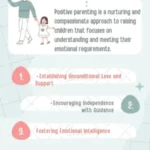In the dynamic landscape of modern parenting, the concept of Positive Parenting stands out as a beacon, offering a profound and effective approach to raising responsible, caring, and resilient children. Unlike fleeting trends, Positive Parenting is a well-balanced methodology rooted in love and respect, fostering a connected and balanced relationship between parents and their offspring.
Understanding Positive Parenting
Shifting Perspectives: From Disciplinarian to Guide
Traditional notions of parenting often cast parents as disciplinarians, emphasizing correction and control. However, Positive Parenting introduces a paradigm shift, recognizing that children are inherently good and in need of guidance as they navigate their emotions and cognitive development.
The term “discipline” itself, derived from the Latin “disciplina” meaning “teaching” and linked to “disciple,” aligns perfectly with the positive parenting philosophy. Instead of shaming or attempting to exert control, positive parenting seeks to teach and empower children, fostering self-regulation skills and avoiding fear-based compliance.
Embracing Authoritative Parenting
Positive parenting transcends the authoritarian model, adopting an authoritative style that combines setting limits with loving guidance. This approach ensures that boundaries are established and corrective actions are taken, but always in a manner that is infused with love and respect.
The positive parent engages in a continuous relationship with their child, encompassing care, teaching, leadership, communication, and unconditional provision of needs. This holistic approach aims to cultivate children capable of regulating both positive and negative emotions, maintaining composure during challenges, and adeptly solving problems within relationships.
The Impact of Positive Parenting on Child Development
Nurturing Emotional Resilience
Research by Seay, Freysteinson, McFarlane (2014) highlights the role of positive parenting in enhancing emotional regulation. The philosophy behind positive parenting focuses on raising children who can effectively manage their emotions, remain calm under duress, and navigate complex social situations.
Eisenberg, Zhou, and Spinrad et al. (2005) extend this understanding, linking positive parenting to various benefits such as improved school adjustment, heightened motivation, reduced depressive symptoms, increased self-esteem, and overall positive youth development.
Cognitive Development and Language Skills
Recent studies have not only affirmed the well-established benefits but also unveiled new dimensions of positive parenting. Beyond emotional well-being, positive parenting has been shown to enhance children’s cognitive development and language skills, positioning it as a comprehensive approach to nurturing well-rounded individuals.
Practical Tips for Implementing Positive Parenting
1. Understanding Behavioral Roots
The cornerstone of positive parenting lies in recognizing that all behavior is a form of communication. By delving into the root causes of a child’s actions, parents can become adept stress detectives, preempting potential meltdowns and tantrums by addressing underlying frustrations.
2. Balancing Emotion Acknowledgment and Behavioral Correction
Acknowledging and accepting a child’s emotions while simultaneously correcting their behavior forms the crux of positive parenting. This nuanced approach distinguishes it from permissive parenting, offering clear boundaries while fostering a warm understanding of a child’s emotional landscape.
3. Collaborative Boundary Setting
Positive parenting advocates for collaborative boundary-setting, eschewing the extremes of control or permissiveness. By working with the child, parents can set clear boundaries, address inappropriate behavior, and guide the child toward understanding the root causes of their actions.
4. Teaching, Not Punishing
Rather than focusing on punitive measures for unwanted behaviors, positive parenting emphasizes teaching and learning. Shifting the narrative from “what not to do” to “what to do instead” empowers children with essential life skills, contributing to their overall development.
5. Empathy from a Child’s Perspective
A key tenet of positive parenting is the ability to empathize with a child’s perspective. By considering their experiences and needs, parents can build a responsive and sensitive environment, fostering a deeper connection with their children.
6. Aligning Parenting with Developmental Milestones
Understanding the intricacies of brain development and age-appropriate behavior is crucial in positive parenting. Recognizing the evolving nature of a child’s emotional regulation system and adapting parenting techniques accordingly provides a safe space for healthy development.
7. Reflection for Self-Regulation
Encouraging children to reflect on their actions, rather than dictating their emotions, serves as a powerful tool for self-regulation. By asking open-ended questions and allowing children to express their feelings, parents facilitate the development of crucial brain connections.
8. Incorporating Humor and Play
Acknowledging the significance of play in learning, positive parenting advocates for the use of humor and laughter in parenting. Transforming tasks into games not only makes regulation activities enjoyable but also nurtures regulation skills without stifling joy.
9. ACT Method: Accept, Connect, Teach
Implementing the ACT method—Accept, Connect, Teach—provides a structured approach to positive parenting. By accepting a child’s emotions, connecting with them emotionally, and then guiding them through the situation, parents can intentionally respond rather than react impulsively.
10. Unconditional Love as the Foundation
Above all, positive parenting emphasizes unconditional love and acceptance. Dr. Gordon Neufeld underscores the importance of children resting in the security of unconditional love, free from the burden of meeting conditional expectations.
In Conclusion
Positive parenting transcends conventional approaches, offering a comprehensive and effective strategy for nurturing children. By amalgamating kindness with firm guidance, positive parenting establishes a foundation of mutual respect and a resilient parent-child connection that spans a lifetime.
Read also: Exploring Parenting Styles: A Comprehensive Guide





